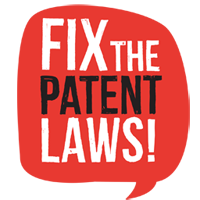 [Marcus Low, Treatment Action Campaign, Link (CC-BY-SA)] We are deeply perturbed by revelations in last Friday’s Mail & Guardian exposing what appears to be a very well-funded, covert plot by foreign pharmaceutical companies and their local subsidiaries to delay a democratic law reform process in South Africa. The law reform concerns the new draft intellectual property policy developed by the Department of Trade and Industry (DTI). This policy has already been delayed for many years. The leaked documents expose a secretive US$ 500,000 plot to delay the policy even further.
[Marcus Low, Treatment Action Campaign, Link (CC-BY-SA)] We are deeply perturbed by revelations in last Friday’s Mail & Guardian exposing what appears to be a very well-funded, covert plot by foreign pharmaceutical companies and their local subsidiaries to delay a democratic law reform process in South Africa. The law reform concerns the new draft intellectual property policy developed by the Department of Trade and Industry (DTI). This policy has already been delayed for many years. The leaked documents expose a secretive US$ 500,000 plot to delay the policy even further.
We do not dispute the right of the companies involved to argue against patent law reform. They have had ample opportunity to make their case during last year’s period of public consultation and during meetings they had with the DTI before that. What does concern us is the intent to deceive the South African public. The leaked documents indicate that this will be done through rigging research into the impact of policy changes and by setting up a front organization called Forward South Africa. Forward SA would have a prominent South African person as its public face, but would secretly be run from the U.S. It is the stuff of conspiracy theories, but set down in documents circulated between members of the Innovative Pharmaceutical Association of South Africa (IPASA) and endorsed by Michael Azrak, head of IPASA’s intellectual property committee.
In a statement released last Friday and in comments to the media IPASA tried to distance themselves from the plot claiming that they did not solicit the plan produced by the US PR firm PAE. However, these claims are contradicted by an email sent on January 10th in which Azrak wrote that PAE had been selected after “a detailed process, where we received proposals from a number of agencies both local and international. The final selection was carried out in consultation with PhRMA.” PhRMA is IPASA’s US equivalent who would have bank-rolled most of the scheme.
While the plot would produce systematically biased research, the public interest requires that we evaluate the impact of policy changes as objectively as possible. The available evidence, for example, indicates no correlation between reasonable and lawful intellectual property laws and foreign direct investment. In India, a country that has already implemented many of the DTI’s proposed changes, foreign direct investment has consistently increased (realizing FDI in their pharmaceutical industry of US$1 billion from April-June 2013 alone). Despite industry’s threats to the contrary, the evidence demonstrates that FDI in the pharmaceutical sector is driven by cheap production and labour costs and other economic incentives, not by patent laws.
It is also important to note that pharmaceutical procurement in South Africa is the 5th largest driver of the trade deficit, driven primarily by the import of patented medicines from the US, Germany, and France. Even though in terms of quantity we import the majority of our medicines from India, India only ranks fourth in terms of expenditure. Since South Africa is a an outlier in terms of the high numbers of poor quality patents we grant, the pharmaceutical deficit is much higher than what it needs to be.
Remarkably, we do not actually examine patent applications in South Africa. If you fill in the forms correctly, you will receive a patent. Then, if a generic company takes the expensive risk of challenging a patent in court, the bar for what deserves a patent is set so low as to make success unlikely or uncertain. It is therefore not surprising that our local generic industry (through the National Association of Pharmaceutical Manufacturers (NAPM), their industry body) has taken the opposite view to that taken by IPASA and are broadly in support of the proposed reforms.
While IPASA’s member companies have an obvious economic interest in being granted stacks of patent monopolies, granting patents where there is no real innovation does not serve the public interest. The DTI’s proposals will still allow new cancer or TB cures to be patented – what it will finally bring an end to is the absurd situation where companies are continually granted new patent monopolies for making small or obvious changes to existing medicines. If anything, raising the bar for patentability will increase the incentive to invest in meaningful innovation since it will reduce the frivolous patenting of new uses, new forms and new formulations of existing medicines that differ only minimally from existing products.
Other developing countries like Argentina, Brazil and India have led the way in making these sensible amendments to their patent laws, amendments that are all permissible under the WTO’s TRIPS regime. Given our severe burden of ill health caused by both communicable and non-communicable disease, not to mention our government’s Constitutional obligation to progressively improve access to healthcare services, South Africa must do the same.
Of course, IPASA will rehash the argument that whatever changes we make to our patent system will reduce their incentive to invest in R&D. Had the members of IPASA spent 40 or 50% of sales on R&D, rather than the current average of below 10%, then we would have a lot more sympathy for this argument. However, as shown in SEC filings and financial reports, these companies spend mostly on marketing, lawyers, and it seems when not thwarted by courageous whistle-blowers, plots to deceive the public and derail democratic processes in developing countries.




